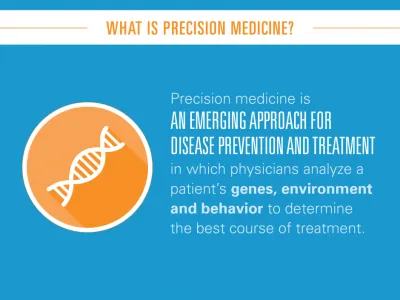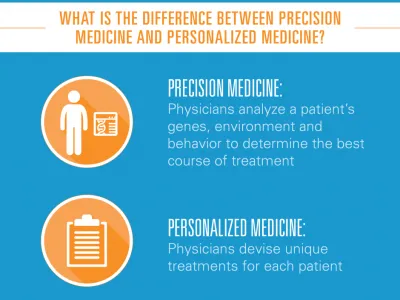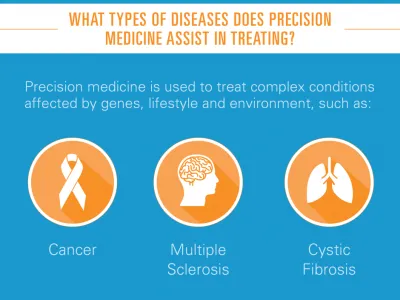Bright idea: The promise of precision medicine

What is precision medicine?
Think about the last time you streamed a movie or bought a book online. You probably saw a series of recommendations based on your prior purchases, suggestions that likely took into account your age, gender and location.
The same concepts are driving the evolution of precision medicine. By tailoring your care to your genetic makeup, environment and behavior, doctors can make informed predictions about health problems you are likely to encounter-- and recommend the most effective treatments.
How does precision medicine play a role in treating diseases and other conditions?
Doctors already adjust dosages for medications based on a patient’s gender, age and size. Precision medicine enables physicians to further customize treatments based on a patient’s genotype, the microorganisms living in their bodies, their environments and lifestyles. Precision medicine is already used to treat cancer and multiple sclerosis – complex conditions affected by genes, lifestyle and environment. For example, doctors at the Mayo Clinic were able to pinpoint a specific mutation in a young boy’s genes and use the information to quickly diagnose and treat him for a rare condition of the nervous system. Johns Hopkins doctors use precision medicine to determine the type and stage of a patient’s multiple sclerosis to create the most effective care plan.
Has precision medicine proved successful?
The field of precision medicine is still emerging, yet there have already been measureable achievements. One of these is a powerful treatment for cystic fibrosis, a debilitating genetic condition. In about 5 percent of patients, cystic fibrosis is caused by a genetic mutation that affects the movement of salt across the cell membrane. Doctors can use genetic testing to identify cystic fibrosis patients with this mutation, then give them a drug that enables salt molecules to properly flow in and out of cells.
How are the public and private sectors advancing precision medicine?
The National Institutes of Health (NIH) is poised to launch a massive, first-of-its-kind study that will bring the benefits of precision medicine to many more people. The NIH plans to recruit more than 1 million people of all ages, races, ethnicities, geographic locations and socioeconomic backgrounds for a long-term study appropriately called the All of Us Research Program.
Important strides in precision medicine are also taking place in the private sector. For example, in Pennsylvania, Independence Blue Cross provides patients who have been diagnosed with specific types of cancers with access to genetic testing, enabling oncologists to identify the right drugs and the most effective treatment regimens that work best for certain cancer patients’ mutations. In upstate New York, Excellus Blue Cross Blue Shield is piloting a program that offers in-depth genetic testing of prostate cancers to pinpoint mutations and identify the stage to which the cancer has progressed. And Blue Cross and Blue Shield of North Carolina is teaming up with 10 universities and biotechnology companies to facilitate an ambitious precision medicine project aimed at creating better healthcare options for patients with hereditary cancers.



